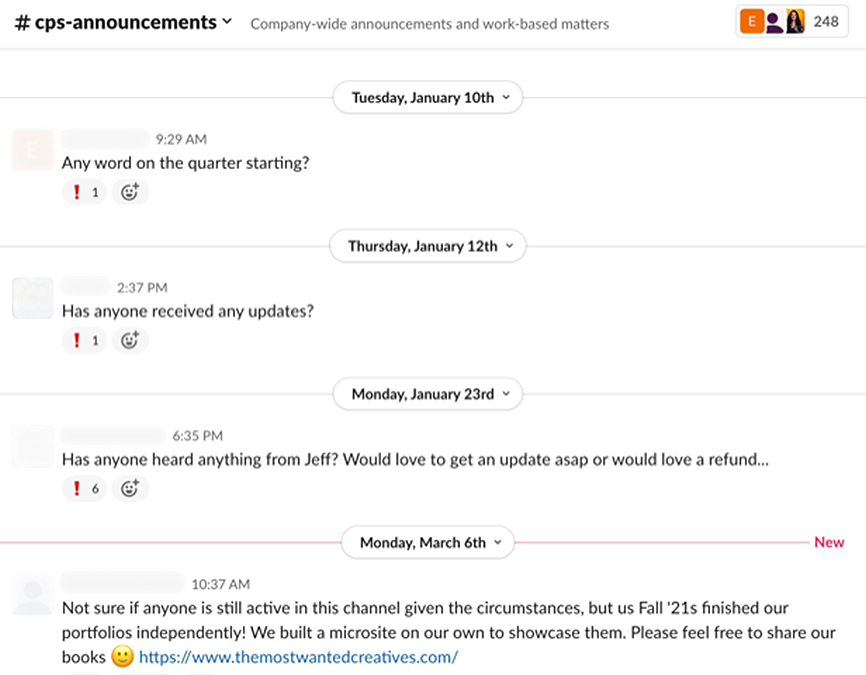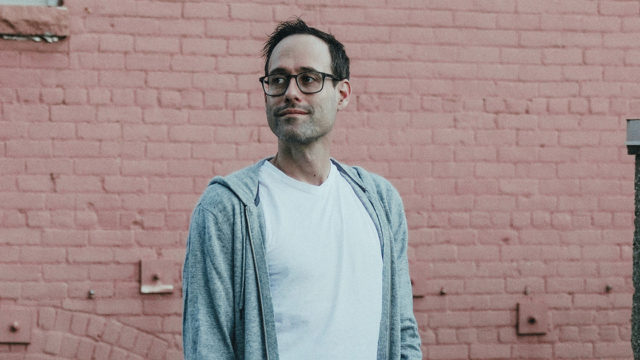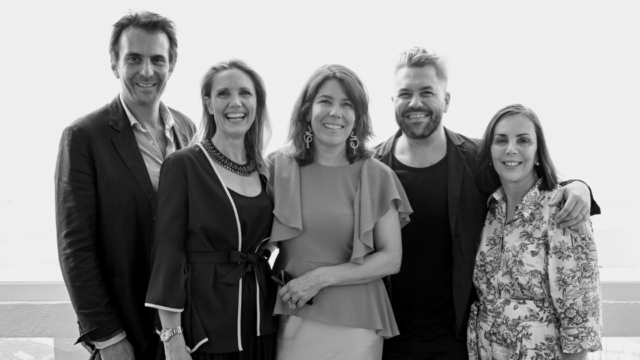What Happened to Chicago Portfolio School? Students and Staff Want to Know
Don’t miss Brandweek, Adweek’s ultimate experience for marketers, September 11-14 in Miami. Connect with peers and gain insights and inspiration from top brand marketers and industry icons at Glossier, Coca-Cola, Taco Bell and more. Register.
Chicago Portfolio School (CPS), once an institution that steadily fed new talent to top agencies, has ceased operations after periods of disorganization and lulls in communication, six former students and five instructors tell Adweek.
Administrators cut off contact before the winter quarter, which was scheduled to begin in January.
The school’s website shut down in February, CPS has not been active on social media since June 2022, and, according to sources, ended its Slack subscription, which blocks users from viewing past messages. Instructors and students allege the school’s executive director, Jeff Epstein, has dodged refund inquiries and tax form requests.
The cost of the one-year program was $19,260, according to a GoFundMe page that supported scholarships for Black creatives.
Epstein, who founded and led the school since 2000, did not respond to Adweek’s request for comment.

Leading up to the summer 2022 quarter, Adweek covered the ongoing business challenges at CPS. “I’m responsible for all the good things, and I’m responsible for all the bad things,” Epstein told Adweek at the time.
Epstein’s corporation, Dogwhistle, operates CPS as a for-profit business. The State of Illinois changed Dogwhistle’s status to dissolved in August 2016. According to sources, and a 2018 Adweek article, Epstein has also faced a series of landlord disputes.
Deserting students
Shauntee Colston Jr., a design student who started last July, began questioning CPS’ practices just a few months later. After being promised the school’s standard course load of four classes per quarter, Colston said he received access to just two classes. When he was offered courses that did not align with the design track, he said Epstein told him “all classes are helpful to everyone.”
For Colston, the biggest disappointment was failing to experience CPS’ fifth quarter, when the school promised to help students build their portfolios and share their books on social channels.
The facade started to disintegrate.
Sarah Chaffin, former student, CPS
“It would be great if the school existed to help me with a network,” Colston told Adweek. “I wasted all of my time. I ended up doing all the work on my own, when the whole point was to not do it solo.”
While the school’s Pipeline Fund Scholarship covered Colston’s tuition, he reflected on the complications of having to “go back to square one.”
“We were left on our own to complete our portfolios,” he wrote. “We were left on our (own) to reach out to recruiters and market ourselves, things that were promised when we enrolled.”
Sarah Chaffin, who dropped out of the school’s strategy program before the summer 2022 quarter, was feeling frustrated after waiting on Epstein’s delayed schedule releases, only to find out the placements had “nothing to do with my discipline.” Chaffin was in CPS’ first class of strategy students. Previously, the school only offered a creative tracks.
Chaffin left the program alongside former student Arianna Palafox and the rest of her cohort, who claimed they were “being scammed” by an administration that offered another track without expanding resources.
“The facade started to disintegrate,” Chaffin told Adweek. While strategy students were sent course catalogs, obtained by Adweek, before each quarter, sources said Epstein ultimately did not give students a say in their schedules.
“Only one course was strategy, and it was taught by Jeff himself, who has no strategy experience,” she said. “Another was taught by someone with my same level of experience.”
In a July 2022 response to Chaffin’s email about her cohort leaving the program, Epstein wrote, “I understand I made some horrible decisions and disrespected your time and money. I’m embarrassed by my lack of action. I am grateful for your patience and understanding and will do everything I can to make things right for you.”
Palafox requested a refund for classes she wasn’t able to attend while undergoing breast cancer treatment. She attached notes from her surgeon in an Aug. 1, 2022 email to Epstein. She says he hasn’t responded.
Chaffin paid her CPS tuition through the education platform Leif. Despite the school going dark in January, Leif continued requesting payments. “I do not want to be tied to (CPS) anymore, and I do not owe any money towards this program,” Chaffin wrote to Leif. The platform has since cut ties with CPS.
Creating conflict with instructors
A former employee, who requested anonymity, started to grow wary when Epstein put multiple cohorts in the same classes without hiring more instructors.
The employee has also faced tax return complications since 2021. When her home state couldn’t verify Dogwhistle as a business, she needed Epstein to sign a letter that said she was employed by the company. He claimed tax collectors were “just confused” by Dogwhistle doing business as Chicago Portfolio School. She submitted a W-2 in January 2022, but the revenue agent was again unable to verify the withheld amount and couldn’t process the return until June 2022, which was after she resigned. In January 2023, she didn’t receive a W-2 at all.
I didn’t agree with what Jeff was doing. … I wanted to stay for the students.
Former CPS instructor
Another source, a CPS alum, was asked to mentor a student in summer of 2020 and, later, asked to teach a class. “Getting Jeff to pay me was a struggle,” the source said about her experience. Epstein stopped using direct deposit during the winter 2022 term and claimed to have sent her a check that she never received. After “ignoring text messages for a few weeks,” she was finally compensated a month later via Zelle without any response or acknowledgment from Epstein.
“I wouldn’t be where I am if it wasn’t for portfolio school, and even though I didn’t agree with what Jeff was doing, he was having a hard time finding teachers and I wanted to stay for the students,” she said. “Putting their confidence into this program and having been treated this way was so disrespectful.”
Reviewing the value of portfolio school
Once seen as indispensable resume boosters, portfolio schools have more recently stirred debate. Some graduates credit portfolio schools for helping them build a body of work that mirrors actual industry deliverables, while critics point to the additional years of schooling and high price tags that can box talent out of recruitment conversations.
A former CPS student, who chose to be referred to as SC, attended CPS until the school went silent in January.
“I wanted to do something that would give me the foundational skills that I needed without also continuing to break the bank,” said SC, who held down a full-time job while working at CPS. “Everything just seemed to fall apart. It just all seems like it was for nothing.”
Former students Adweek spoke with said CPS was an affordable option. They were also motivated by having conversations with graduates who held positions at top agencies, as well as the school’s claim in promotional materials that 94% of grads get jobs within six months of graduation in their preferred field.
Chicago Portfolio School’s apparent closure accompanies the shutdown of Atlanta-based Creative Circus, which ceased new enrollment last spring and will close at the end of this year. The Watford Course in the U.K. also shut down in 2021, and The School of Communication Arts in London has also been candid about its financial struggles.
Free online resources, in-house agency incubators and the industry’s prioritization of fresh pipelines and heightened diversity have all led to the demise of ad schools. Ogilvy now offers an internal program for Black public high school students in Chicago, which features a free virtual education series followed by paid experience.
James Kinney, global chief people officer at Media.Monks, said portfolio schools can add value by allowing students to hone their craft and create real campaigns.
I said to myself, ‘I’m going to get a job, and this will be worth the money for me.’
Brittany Theo, former CPS student
“We need the non-portfolio school people, we need the state school people, and you need some Ivy League,” said Kinney, who added that Media.Monks does not require candidates to have college degrees. “To make the best work, you need that cognitive mix. That’s one of the broadest definitions of diversity.”
A new way to learn
Sarah Latz and Francesca Piancone, two former CPS instructors, started Book180 in the fall as a more affordable alternative to the portfolio school market. Other organizations are challenging the portfolio school model, too. One School, a free 16-week portfolio school, is built for Black creatives. The Workshop is a free mentorship program for those looking to pivot into advertising after leaving another industry.
Brittany Theo, a former student who was enrolled at CPS until its closure, was told by friends that “no one would even look at (her)” if she didn’t go to portfolio school. “I said to myself, ‘I’m going to get a job, and this will be worth the money for me.”
A new generation of agency executives is trying to dispel that myth, including Geoffrey Goldberg, co-founder and CCO of Movers+Shakers. He said his agency looks for talent with “creative skills that are relevant today, not those who have been trained by masters of yesterday.”
For Chaffin, the school’s downfall speaks to the need for mentorship across an industry that is notoriously challenging to break into.
“It is of paramount importance for people who are already in the industry to take on mentees and help out where they can,” she said, adding this advice to agency leaders: “If you see a message in your inbox, answer it. If you put on your blinders, our mix of talent is going to be pretty dismal.”
https://www.adweek.com/agencies/what-happened-to-chicago-portfolio-school-students-and-staff-want-to-know/


